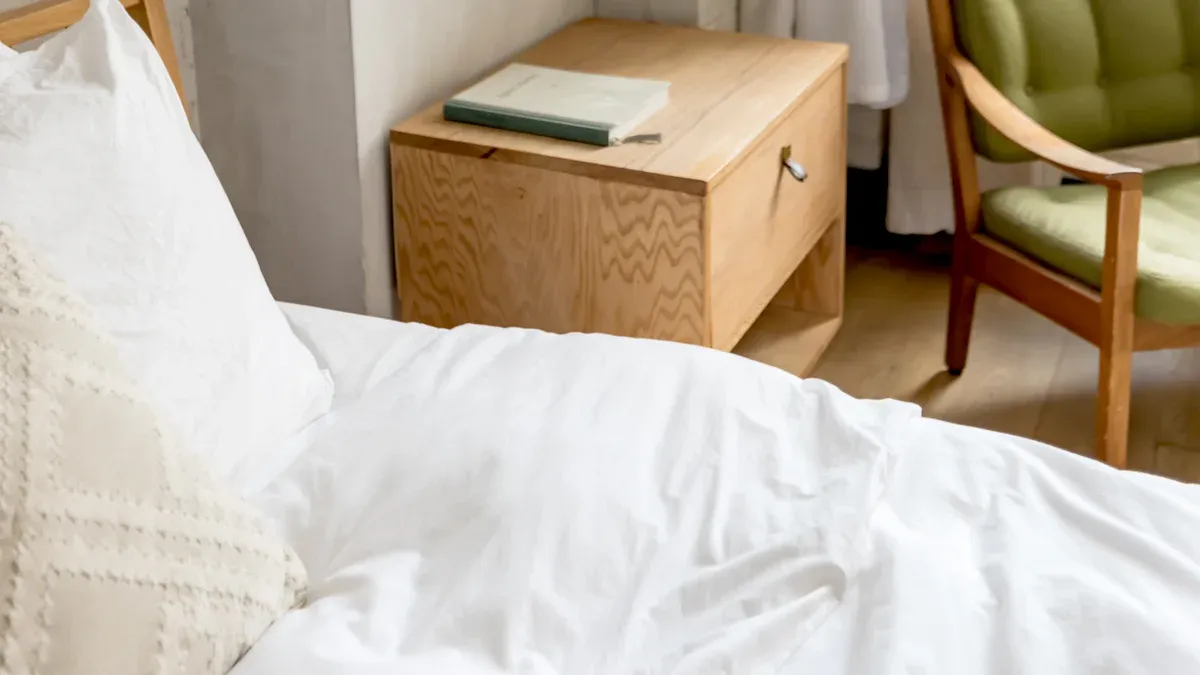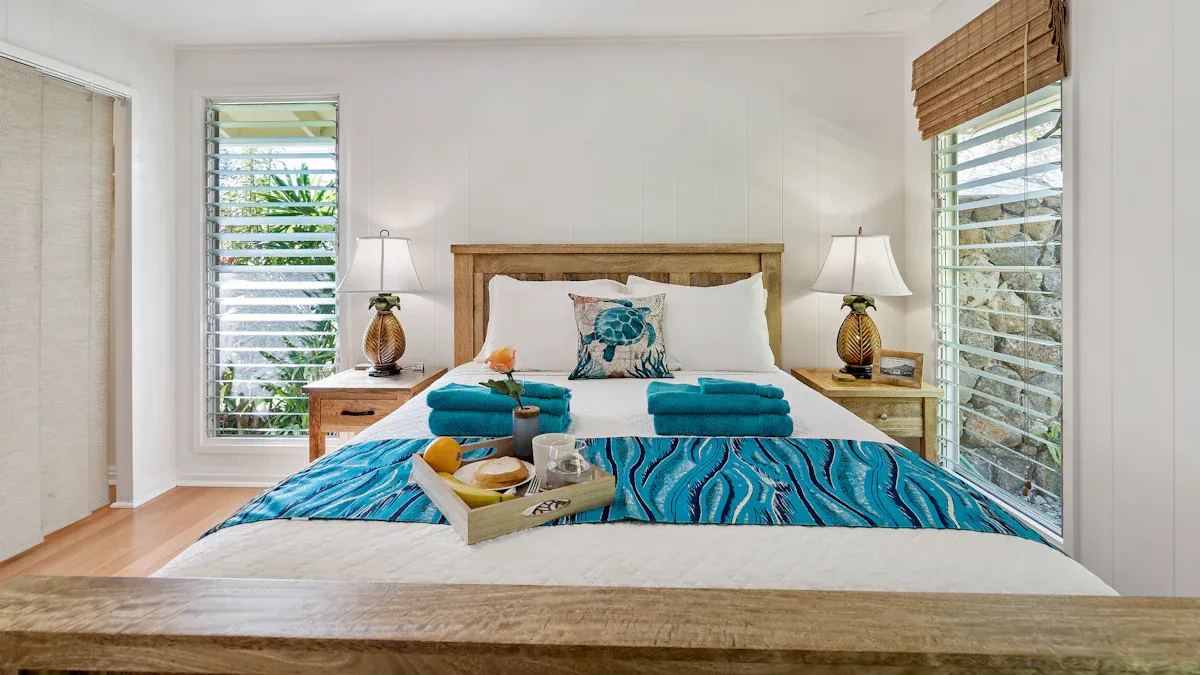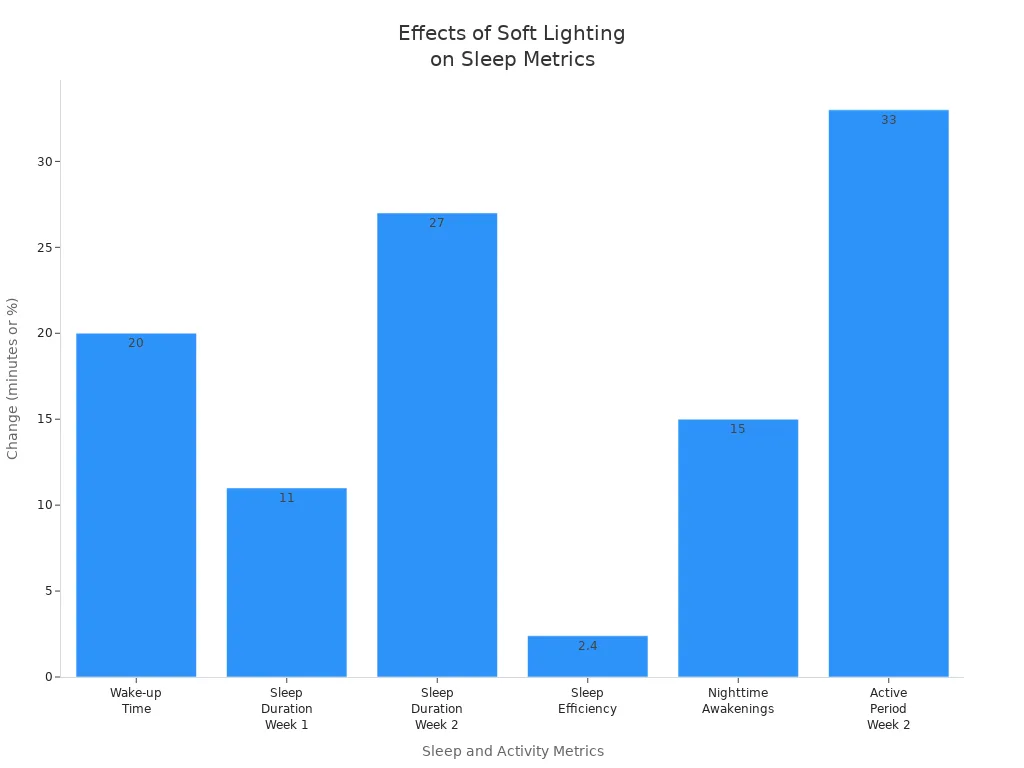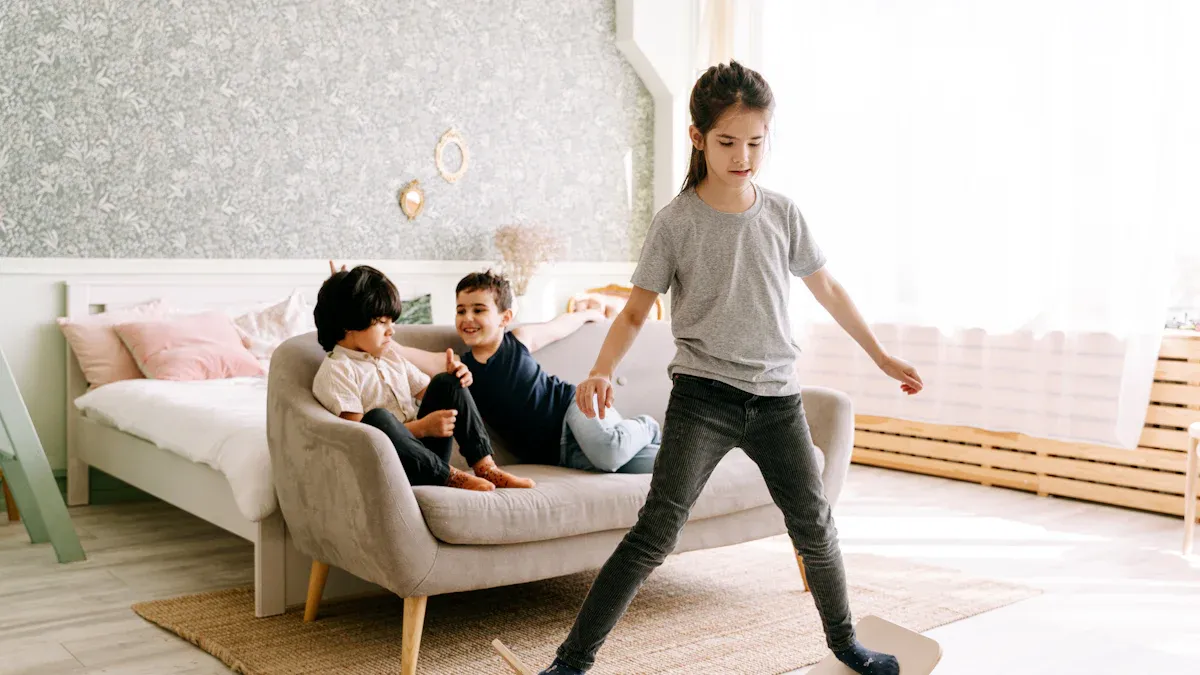
When you bring feng shui for the bedroom into your space, you invite calm and balance. Many people say feng shui for bedrooms helps them sleep better and feel more relaxed.
A 2021 study found that feng shui can improve well-being and sleep quality.
Another study noticed a link between feng shui and positive feelings in hotel rooms.
Take a look around your bedroom. Small changes can make a big difference!
Key Takeaways
Put your bed in a strong place to help energy move and help you sleep well.
Make sure your bedroom is clean and tidy to lower stress and help you feel better.
Pick gentle colors and soft lights to make your room calm and help you relax.
Why Feng Shui for the Bedroom Matters

Energy Flow
You spend a lot of time in your bedroom, so the way energy moves in this space matters. Feng shui for the bedroom teaches you to pay attention to energy flow. When you arrange your bed and furniture with care, you help Qi move freely. This can lift your mood and help you feel less weighed down.
"Where your bed is placed affects the flow of Qi, or life energy, in the room. A bed positioned in a commanding position allows for healthy movement of Qi and removes negative energy that may be weighing you down."
If you follow feng shui rules, you create a space that feels open and peaceful. You might notice that you feel more relaxed and ready to rest. Good energy flow can make your bedroom feel like a safe place to recharge.
Sleep and Well-Being
Your bedroom should help you sleep well and wake up refreshed. The average American spends 11 hours a day lying on their bed. That means your bedroom has a big impact on your health and happiness. Feng shui for bedrooms focuses on creating a balanced sleeping environment.
A solid headboard gives you support and helps you sleep better.
Placing your bed in the right spot can lower anxiety and help you rest.
Removing electronics keeps your sleep patterns steady.
Natural lighting boosts your mood and energy.
When you use feng shui rules, you turn your bedroom into a sanctuary. You feel calm, safe, and ready to face the day. A balanced bedroom supports restful sleep and harmony in your life.
Feng Shui Rules for the Bedroom
Creating a balanced and peaceful bedroom starts with a few simple feng shui rules. These ideas help you set up your space for better energy, sleep, and comfort. Let’s look at the most important tips for a great feng shui bedroom layout.
Bed Placement
The way you place your bed shapes the energy in your room. Good bed placement rules can help you feel safe and relaxed. Here’s how you can get it right:
Place the bed in a commanding position. This means you should see the door while lying in bed, but your bed should not line up directly with the door. You feel more secure and in control this way.
Avoid corners. Don’t push your bed against a corner. Leave space on both sides so energy can flow and you can get in and out easily.
No windows behind the bed. Keep your bed away from windows. A solid wall behind you gives support and helps you rest.
Watch the bathroom door. Try not to have the foot of your bed facing the bathroom door. This keeps negative energy away while you sleep.
Tip: If you can’t move your bed, use a screen or tall plant to block direct lines from the door.
Here’s what studies and experts say about bed placement and sleep:
Evidence Type |
Description |
|---|---|
Client Sleep Journals |
People who adjust their bed with the seasons get better rest. |
Hybrid Approach Results |
Mixing feng shui with modern ideas helps you fall asleep faster and feel better. |
Sleep Studies |
Good bed placement leads to deeper sleep and fewer wake-ups at night. |
Headboard and Wall Support
A solid headboard is more than just decor. It gives you support and helps you feel safe while you sleep. Here’s why you need one:
A solid headboard supports your energy and makes you feel secure.
It acts like a mountain behind you, giving you a strong base for growth and relationships.
Without a headboard, your energy can scatter, making you feel restless.
A sturdy headboard keeps your energy grounded and steady.
Note: Choose a headboard made of wood or soft fabric for extra comfort and support.
Nightstands and Symmetry
Nightstands do more than hold your lamp or book. They help create balance in your bedroom. You don’t need perfect symmetry, but you do want harmony.
The best feng shui bedroom layout uses two nightstands, one on each side of the bed. This setup brings balance and makes the room feel calm. You can use different styles or colors, but try to keep them similar in size. This way, your space feels even and peaceful.
Calming Colors
Color has a big impact on how you feel in your bedroom. Feng shui for bedrooms suggests using calming shades to help you relax and sleep better. Here’s a quick guide:
Color |
Psychological Effect |
|---|---|
Blue |
Lowers energy and brings calm. |
Gray |
Neutral and peaceful. |
Green |
Feels soothing, like nature. |
Pastel Pink |
Softens the mood and reduces stress. |
Pastel Yellow |
Calms you and adds a touch of happiness. |
Tan |
Makes the room feel cozy and safe. |
White |
Clean and relaxing, perfect for a peaceful space. |
Try painting your walls or adding decor in these colors for a calm and restful vibe.
Soft Lighting
Lighting changes the mood of your bedroom. Soft lighting helps you relax and get ready for sleep. Studies show that gentle lights can help you wake up earlier, sleep longer, and feel more rested.
Findings |
Details |
|---|---|
Wake-up Time |
Wake up 20 minutes earlier |
Sleep Duration |
Sleep up to 27 minutes longer |
Sleep Efficiency |
Improves by 2.4% |
Nighttime Awakenings |
15 minutes less awake at night |
Active Period |
Start your day 33 minutes earlier |

Use lamps with warm bulbs or dimmers. Avoid harsh overhead lights for a softer, more peaceful glow.
Natural Elements and Plants
Bringing nature into your bedroom boosts positive energy and peace. Plants and natural decor help you relax and feel at ease.
Plants and nature art create a calming space, perfect for rest.
Natural elements help energy flow and make your home feel balanced.
A well-balanced room lets energy move freely, which supports your well-being.
Studies show that indoor plants can filter toxins and make the air cleaner. Some plants, like Lavender and Jasmine, help you feel calm and may improve sleep. The look and feel of plants can lower stress and make your bedroom a peaceful retreat.
Ideas: Try adding a small plant, a vase of fresh flowers, or a nature-themed picture to your decor.
A few simple changes can transform your bedroom. Use these feng shui rules to create a space that feels clean, clutter-free, and full of positive energy. You’ll notice more balance, better sleep, and a sense of peace every night.
Feng Shui for Bedrooms: Don'ts

When you want a calm and balanced bedroom, it helps to know what to avoid. Many people make simple mistakes that block energy flow and disturb sleep. Let’s look at the most common feng shui rules people break and how you can fix them.
Poor Bed Placement
Bed placement shapes the energy in your bedroom. If you put your bed in the wrong spot, you might feel uneasy or have trouble sleeping. Here are some common mistakes:
Placing your bed directly in line with the door. This is called the "coffin position" and can make you feel exposed.
Putting the headboard against a window. This can cause energy loss and make you feel less supported.
Using a mirror that faces your bed. Mirrors can bounce energy around and disturb your rest.
Having a mirror facing the bedroom door. This can push good energy right back out.
Tip: Move your bed so the headboard rests against a solid wall. Try to see the door from your bed, but don’t line up with it. If you can’t move your bed, use a screen or a tall plant to block direct lines from the door or mirror. (For more on optimizing your bedroom layout, see How to Arrange Your Bed for the Best Feng Shui Results.)
Clutter and Disorganization
Clutter is one of the biggest blocks to good energy flow. It makes your bedroom feel chaotic and can hurt your sleep and mood. Research shows that clutter:
Delays sleep and disrupts sleep cycles.
Makes it hard to unwind and relax.
Can lower self-esteem and make you feel inadequate.
May even lead to social isolation because you don’t want guests to see your space.
Keeps your brain alert at night, making it hard to fall asleep.
If you want a calm and restful bedroom, clearing clutter is key. Keep your space clean and clutter-free. Store only what you need and love. Use baskets or boxes to organize small items. Try to make your bed every morning and put away clothes right away.
Try this: Set a timer for 10 minutes each day to tidy up. Small steps help you avoid clutter and keep your bedroom feeling fresh.
Work and Exercise Items
Your bedroom should be a place for rest, not work or workouts. When you bring in a desk, computer, or exercise equipment, you mix active energy with calm energy. This can make it hard to relax and sleep.
If you need to work in your bedroom, try these ideas:
Use a small screen or curtain to separate your work area from your bed.
Put away your laptop and papers at night.
Avoid using bright lights in your work zone before bed.
For exercise gear, store it in a closet or another room if possible. If you must keep it in your bedroom, choose a spot out of sight. This helps your mind switch off and get ready for sleep.
Harsh Colors and Lighting
The colors and lighting in your bedroom can affect your mood and sleep. Bright or harsh colors, like neon or bold red, can make you feel alert and restless. The wrong lighting can also disturb your sleep cycle.
Here’s what studies say about lighting and sleep:
Light Color |
Wavelength (nm) |
Effect on Melatonin Production |
|---|---|---|
Blue |
450–480 |
Significantly reduces melatonin, making it harder to sleep |
Red |
600–700 |
Stimulates melatonin production, improving sleep quality |
Green/White |
N/A |
Can disturb sleep, increasing alertness and reducing melatonin |
Yellow/Orange |
N/A |
Minimal impact on melatonin, more conducive to sleep |
Choose soft, warm lights and calming colors for your decor. Try gentle shades like blue, green, or tan. Use lamps with warm bulbs instead of harsh overhead lights. (Learn more about the impact of color on mood in What Taoism Teaches About Going With the Flow.)
Excessive Electronics and Mirrors
Too many electronics and mirrors in your bedroom can disturb your sleep and energy. Screens from TVs, phones, and tablets give off blue light, which keeps your brain awake. Mirrors reflect light and movement, which can make you feel restless.
Scientific studies show that mirrors facing the bed can disrupt sleep by reflecting light and creating visual distractions. This can lower melatonin and make it hard to relax. Some people even feel anxious or uneasy when they see their reflection at night.
"According to feng shui beliefs, mirrors facing the bed can disrupt the flow of energy and reflect negative emotions, leading to feelings of unease and restlessness during sleep."
Here are some ideas to fix this:
Remove or cover mirrors that face your bed.
Keep electronics out of the bedroom, or turn them off an hour before bed.
Use an alarm clock with a soft light instead of your phone.
A few simple changes can help you restore balance and create a calm, restful space. Follow these tips to keep your bedroom clean, clutter-free, and full of positive energy. (For deeper understanding of light effects on sleep, see How Taoism Supports Lasting Health and Well-Being)
Fixing Feng Shui Mistakes
Bed and Layout Adjustments
You can fix common mistakes in your bedroom by making a few smart changes to your layout. The right placement of your bed and furniture helps energy flow and brings balance. Check out this table for quick ideas:
Adjustment Type |
Recommendations |
Mistakes to Avoid |
|---|---|---|
Ideal Bed Placement |
Place your bed diagonally across from the door, with the headboard against a solid wall. Make sure you can see the entrance. |
Avoid putting your bed right in front of the door, floating beds, or beds under ceiling beams. |
Small Bedroom Tips |
Use a solid headboard, heavy curtains, and two nightstands. Keep pathways clear. Limit storage under the bed. Avoid mirrors facing the bed. |
Don’t put your bed under a window, block the door, use only one nightstand, store things under the bed, or have mirrors reflecting the bed. |
If you have a feng shui bedroom layout with desk, try to keep your bedroom for rest by placing the desk far from your bed. This helps keep your energy calm and focused on sleep.
Decluttering Tips
Clearing clutter is one of the best ideas for a calm and clutter-free bedroom. Research shows that messy spaces can raise stress and make it hard to sleep. When you avoid clutter, you help your mind relax and your body rest.
Clear surfaces like nightstands and dressers.
Use storage bins, drawer dividers, and shelves to organize your things.
Make your bed every day and put away clothes right away.
A clean bedroom lowers stress and helps you wake up feeling refreshed. Try these tips to keep your space tidy and peaceful.
Remember: A clutter-free room supports better sleep and positive energy.
Decor and Lighting Fixes
You can restore balance in your bedroom with a few simple decor and lighting ideas. Use soft lighting for a relaxing mood, but add brighter lights for reading or getting ready. Pair lamps and nightstands for harmony. Choose decor that feels natural, like woven baskets or jute rugs, to bring in organic textures.
Mix ambient, task, and accent lighting for the best flow.
Add feng shui symbols or the five elements to your decor for extra balance.
Keep your decor simple and avoid too many items.
A good bedroom feng shui layout uses these ideas to create a space that feels calm, balanced, and full of positive energy.
You can create a peaceful bedroom by making small changes.
Place your bed for good Qi flow and comfort.
Clear clutter to help energy move freely.
Pick calming colors and soft lighting.
Add meaningful artwork and natural touches.
Many people notice better sleep and more energy after simple feng shui updates. Try these tips and see how your space feels!
FAQ
Can I use any plant in my feng shui bedroom?
Not all plants work well. Choose gentle, air-purifying plants like snake plant or peace lily. Avoid spiky or thorny plants for a calm vibe.
What if I have a small bedroom?
You can still use feng shui. Keep your space tidy. Use a solid headboard. Place your bed so you see the door. Add soft lighting.
Do I need to follow every feng shui rule?
No, you do not. Start with a few changes. Notice how you feel. Pick what works best for your space and comfort.






